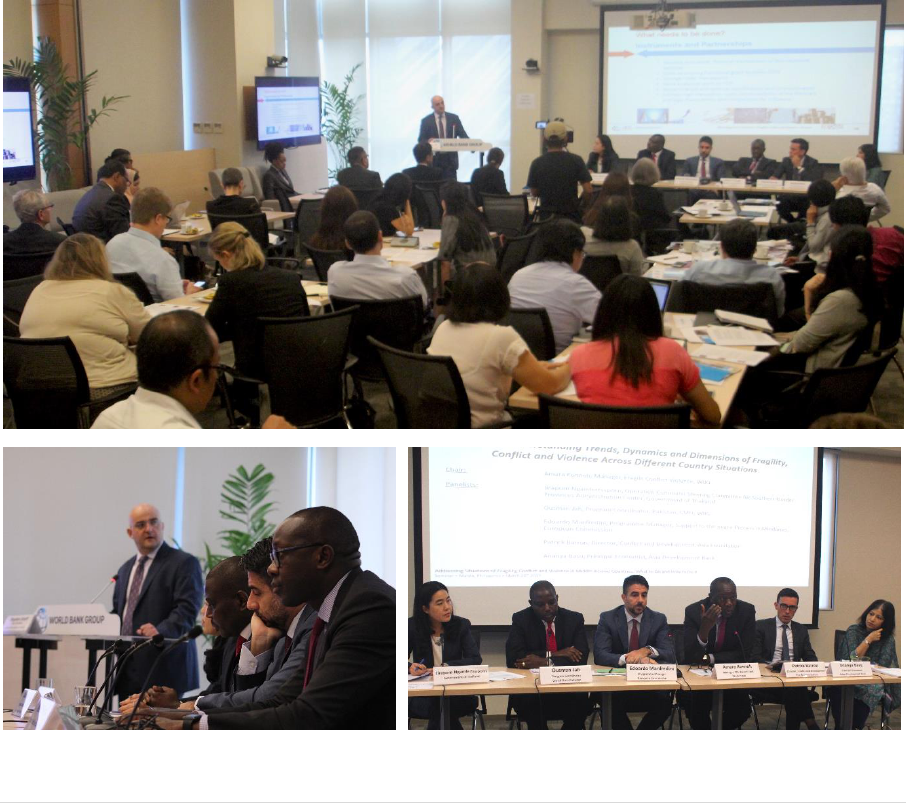
March 28, 2017, Manila, Philippines I Post-Workshop Conference Summary
Using Evaluation Evidence to Improve
the Effectiveness of World Bank Group
Involvement in Middle-Income Countries
Dealing with Fragility, Conflict, and Violence

1 | Using Evaluation Evidence to Improve the Effectiveness of World Bank Group Involvement in Middle-Income Countries
Dealing with Fragility, Conflict, and Violence, March 28, 2017, Manila, Philippines, Post-Workshop Conference Summary
Background
The Independent Evaluation Group (IEG), in partnership with the Fragility, Conflict, and Violence
Cross-Cutting Solutions Area (FCV CCSA) organized a regional learning event on March 28, 2017, in
Manila, the Philippines, to discuss the implications of IEG’s evaluative findings for enhancing the
effectiveness of World Bank Group engagement with middle-income countries dealing with
situations of fragility, conflict, and violence (FCV). The event was jointly hosted by the World Bank
Group Philippines Country Management Unit and the Asian Development Bank (ADB). Close to 80
participants from across the development spectrum attended the workshop (including World Bank
Group and ADB staff, government officials, academics, civil society members, and staff from
multilateral and bilateral development partners).
This note summarizes the discussions and key takeaways from the workshop for the benefit of the
broader development community and other stakeholders. It is intended as a starting point for
further discussions related to improving the design and implementation of development programs
in FCV situations. It concludes with some learning implications to move this agenda forward.
Why Focus on Middle-Income Countries Dealing with FCV Situations?
FCV is known to have significant adverse effects on economic development and poverty levels.
According to the World Development Report 2011: Conflict, Security, and Development, countries
that experienced major violence from 1981 through 2005 had poverty rates 21 percentage points
higher than those that did not experience significant violence (World Bank 2011). The Institute for
Economics and Peace estimated the cost to the world economy of containing violence at $14.3
trillion in 2014, or almost 13.4 percent of global gross domestic product.
The United Nations Sustainable Development Goals recognize the importance of peace and effective
governance to human development. Sustainable Development Goal 16 proposes to “promote
peaceful and inclusive societies for sustainable development, provide access to justice for all and
build effective, accountable and inclusive institutions at all levels.” This expansive goal implies that
fragility is no longer seen as restricted to fragile states; in fact, fragility and violence affect nearly all
states, and if all types of violence are included—particularly organized criminal violence—FCV can
be seen as primarily a middle-income country problem.
The development community has often linked fragility and violence with a country’s lack of
development progress. However, instances of organized violence in middle-income countries have
recently exceeded those in low-income countries, suggesting that it is no longer primarily a low-
income country problem. Today, violence, or the imminent threat of violence, affects development
outcomes for almost 2 billion people, with 37 percent living in higher-middle-income countries, 37
percent in lower-middle-income countries, and the remaining 25 percent in low-income countries.

2 | Using Evaluation Evidence to Improve the Effectiveness of World Bank Group Involvement in Middle-Income Countries
Dealing with Fragility, Conflict, and Violence, March 28, 2017, Manila, Philippines, Post-Workshop Conference Summary
The Unique Challenges of Operating in FCV Situations
To launch a discussion on how best to engage in situations of FCV in middle-income countries, IEG
partnered with the FCV CCSA to organize a learning event on March 28, 2017, in Manila, the
Philippines (see attached agenda). The workshop provided a platform for dialogue about recent
work by IEG, the FCV CCSA, and the ADB on FCV in middle-income countries. The discussion included
the latest thinking and reflections on operational experience of practitioners working on the
frontlines. Participants included close to 80 practitioners and representatives from 10 countries.
The workshop featured a series of short presentations, followed by panel discussions. Participants
discussed the following topics:
Understanding Trends, Dynamics, and Dimensions of Fragility, Conflict, and Violence across
Different Country Situations
Subnational Conflict and Violence with a Regional or Ethnic Identity Marker
Violence Related to Crime
Addressing External Shocks Such as Forced Displacement and Influx of Refugees
The learning event focused on harvesting insights from participants’ experiences to address key
issues identified during the panel discussions. Among the emerging lessons, participants identified
the following:
1. Partnership is fundamental, and there should be a common objective in working together.
2. The central message of the 2011 World Development Report—calling for strengthening
legitimate institutions and governments in providing security, justice, and jobs—continues
to be alive and strong.
3. Working on FCV requires long-term engagement, consistency, cooperation, and
inclusiveness.
4. It is important to adopt a risk-based approach (management and mitigation of risks), which
demands ex ante understanding of the situation on the ground and adopting an integrated
perspective.
5. It is critical to work through governments, especially in middle-income countries, and to
ensure commitment of local actors.
6. It is fundamental to change the paradigm from reaction to prevention.
7. Development of the private sector so it can generate jobs is critical. It is possible to work
through the private sector in conflict-affected and violent situations.
8. More appetite for risk is needed. An excessively risk-averse approach cannot work in these
environments.
Participants discussed the issues in panels, and the audience was invited to participate in the
discussion through PollEv and WebEx. This summary note is the primary output from the workshop.
It captures the major themes and insights that emerged.

3 | Using Evaluation Evidence to Improve the Effectiveness of World Bank Group Involvement in Middle-Income Countries
Dealing with Fragility, Conflict, and Violence, March 28, 2017, Manila, Philippines, Post-Workshop Conference Summary
One of the persistent major themes throughout the
learning event was that partnership across regions,
sectors, and institutions is fundamental when engaging in
FCV situations, and that this partnership should serve a
common objective. During the event, it became
increasingly clear that none of the issues that were
discussed can be successfully addressed by one institution
alone. In fact, partnering institutions such as the World
Bank Group and the ADB were created as multilaterals,
which reflects the understanding that multilateralism and
partnership is the right approach to address these issues.
This particular theme goes hand in hand with IEG’s finding
in its 2016 evaluation World Bank Group Engagement in
Situations of Fragility, Conflict, and Violence that
partnerships, and especially the World Bank Group–
United Nations partnership, is particularly important in
the FCV context. The United Nations agencies have
political and security-related skills and contacts that the
World Bank needs to leverage, and the United Nations
system is the prime actor on the humanitarian front.
Those partnerships have not always been structured in a
systematic way, and their frequency and effectiveness vary across countries and themes, as several
of the panel discussions brought out. The existing system often makes partnerships difficult to effect
because of perceived high transaction cost, lack of strong staff incentives, incompatibility of the
fiduciary and legal frameworks, and competition for influence and limited donor resources. The
workshop discussion stressed that a more nuanced strategic and technical dialogue is needed to
define respective roles and comparative advantages. It was also noted that partnerships are critical
for resource input, especially for multi-donor trust funds.
The key lesson is that several stakeholders are dealing with the same problems, albeit from different
perspectives. What clearly emerged was that more partnerships need to be built and dialogue needs
to be fostered not just at learning events like these but through better communication,
coordination, and data sharing among technical and local staff.
EMERGING LESSON
Partnership Is Fundamental, and There Should Be a Common Objective
in Working Together.
We are going to have to walk the talk on
mainstreaming; we need to be able to have a
whole country team including many of the
technical global practices working in this
area—be it agriculture, transportation,
energy—all of that work will need to become
conflict-sensitive and conflict-informed.
—Mara Warwick, Country Director, World
Bank Group, the Philippines
There has to be coordination and a common
purpose for organizations working in this
space. One organization—one Asian
Development Bank or one World Bank
Group—cannot do it by itself. You also need
to create trust; this can only be done as an
honest broker with complete impartiality.
—Marvin Taylor-Dormond, Director General,
Independent Evaluation Department, ADB

4 | Using Evaluation Evidence to Improve the Effectiveness of World Bank Group Involvement in Middle-Income Countries
Dealing with Fragility, Conflict, and Violence, March 28, 2017, Manila, Philippines, Post-Workshop Conference Summary
A second theme discussed, which aligns with the central
message of the 2011 World Development Report and
builds on the previous theme of the need for stronger
partnerships, is the need for strengthening legitimate
institutions and governments in providing security, justice,
and jobs (World Bank 2011).
Workshop participants agreed that lasting peace cannot
be attained without development and that everyone has a
distinct role to play. One key area where development
partners must work together is providing financial and technical assistance to support institutional
strengthening and capacity development. Existing government institutions need to be strengthened,
especially at the local level, and the private sector must go beyond regular business operations and
have a direct, sustained engagement with the communities in which it operates. Beneficiaries of
development projects must be empowered to become active agents of change and emerge as
enlightened leaders promoting social cohesion among conflict-affected communities.
This theme goes very much in hand with IEG’s finding that in World Bank Group interventions in
conflict-affected areas, technical assistance components aimed at strengthening the accountability
and transparency of local governments are considered important because they are expected to
increase the legitimacy and credibility of local governments and thus contribute to the sustainability
of conditions for peace over time. Because local institutional capabilities in conflict situations are
often rudimentary, the project interventions in question are often quite basic, do not promise to
deliver much, and tend to be for sustained long-term engagement. As the evaluation points out, this
seems appropriate. It would be unrealistic to expect that strong public financial management
capacity could be built in such adverse circumstances over the lifetime of a single World Bank Group
operation (World Bank 2016). Instead, World Bank projects tend to deliver some basic training,
introduce straightforward processes for budgeting and reporting, and, especially, help boost local
demand for government accountability by reaching out to local nongovernmental players. These
points align with the IEG report highlighting the complexity of engaging with governments, which
have their own views on how to tackle underlying issues of fragility in their countries. Community-
driven development models can be entry points for conflicts that are political in nature. However,
although community-driven development has been a useful vehicle for short-term assistance in FCV
situations, institutions need to be strong and legitimate to ensure program sustainability.
EMERGING LESSON
The Central Message of the 2011 World Development Report—Calling
for Strengthening Legitimate Institutions and Governments in Providing
Security, Justice, and Jobs—Continues to Be Alive and Strong.
The Bank’s willingness to work with a whole
range of partners—including the ones who
may not be our traditional partners, like the
Moro Islamic Liberation Front—has proved
to be very successful.
—Mara Warwick, Country Director, World
Bank Group, the Philippines

5 | Using Evaluation Evidence to Improve the Effectiveness of World Bank Group Involvement in Middle-Income Countries
Dealing with Fragility, Conflict, and Violence, March 28, 2017, Manila, Philippines, Post-Workshop Conference Summary
The third theme focused on the necessity of long-term
engagement, consistency, cooperation, and
inclusiveness in working on FCV. This theme speaks to
the World Bank Group’s comparative advantage, which
lies in long-term development, and entails pulling
resources together, coordinating, and working through
sometimes cumbersome government systems.
The World Bank Group’s engagement in Mindanao, the
Philippines, was mentioned as a good example of active
and effective long-term World Bank Group
engagement for FCV situations in middle-income
countries. An example of this was the partnership with
Unifrutti, an international company operating in
Mindanao. Unifrutti has been active in attracting
investors to Mindanao from leading corporations in the
Philippines and providing advice on how to do
investments. In addition to strong relationships among
the World Bank Group, particularly the International
Finance Corporation (IFC), Unifrutti, and local
government, project partners also got buy-in from
high-level leaders within the Moro Islamic Liberation
Front. This ensured security within the project’s
borders while operating in a highly volatile region.
Meanwhile, Muslim groups in Mindanao viewed the
project positively because Unifrutti had a good record
of establishing a long-term profitable venture in
conflict-affected areas, and it helped the Muslims to be
viewed as a respectable political party. One of the
success factors was the project team’s emphasis on the
assessment of the gender, environment, and peace and
conflict risks during due diligence. For instance, peace
and conflict risk assessment strengthened IFC’s practice
of providing assistance to the farms through third-party
contractors and partner-led firms to minimize exposure
of IFC staff to rebel groups.
EMERGING LESSON
Working on FCV Requires Long-Term Engagement, Consistency,
Cooperation, and Inclusiveness.
Consistency works. Being in it for the long haul
means to consistently commit to work on the
fragility issues in the Philippines. This has been
an institutional commitment, not only from
the country team, but also from the Global
Practices. It also means having to be able
to change, to innovate, to move with the
flow because the peace process itself changes
over time.
—Mara Warwick, Country Director, World Bank
Group, the Philippines
It’s about winning hearts over because they see
an opportunity. A comprehensive development
plan for an entire region is massive. If you can
bring it down to one, for example, municipality
or town that has demonstrated enlightened
leadership and where a private sector group is
willing to step in, then provide resources for a
plan for that one municipality. By doing that,
you involve all the sectors and stakeholders
who are there, and you will not end up with
some new haves in the midst of have-nots.
You create an island of prosperity in the midst
of poverty and everyone can start rising up a bit
at the same time. Once one area is stabilized,
neighbors will look at it and say, “We would also
like to have that.” One winner breeds another
and it keeps on going from there.
Continuity is key. We have a new administration
every six years. If you don’t anticipate the shift,
you will end up dead-ended. Once a
development plan is completed, think of budgets
assigned to the implementing agency to help
them carry the work forward for another three
years within the transition period of the next
administration. Otherwise everything stops cold
and people get very discouraged. The World
Bank Group can assist in maintaining that
continuity.
—John Perrine, Chairman and Chief Executive
Officer, Unifrutti

6 | Using Evaluation Evidence to Improve the Effectiveness of World Bank Group Involvement in Middle-Income Countries
Dealing with Fragility, Conflict, and Violence, March 28, 2017, Manila, Philippines, Post-Workshop Conference Summary
The next lesson underscored that it is prudent to take a risk-based approach (management and
mitigation of risk), which demands that before institutions like the World Bank Group get involved,
they should thoroughly understand the situation in the field and adopt an integrated perspective.
As became clear throughout the discussion—and has been emphasized in IEG’s 2016 report—that
the World Bank Group has been adept at responding to and adjusting its strategies and analytical
support to situations of violence and conflict, but its operational response has been constrained by
its limited menu of instrument choices. Moreover, as expressed in various World Bank documents,
including the 2011 World Development Report, institutional and staff incentives to engage in
conflict situations and take risks seem to be lagging behind the spirit of its strategic approach.
The fifth theme emphasized that it is critical to work
through governments, especially in middle-income
countries. Moreover, the commitment of local actors is
essential. It was noted that FCV situations, particularly in
Asia, are a middle-income phenomenon and require
engaging with governments at different levels and with
different constraints. Dealing with subnational conflicts
requires political reforms. These points align with the IEG
report highlighting the complexity of engaging with
governments that have their own views on how to tackle
underlying issues of fragility in their countries. It was
noted that the community-driven development model can
be an entry point to conflicts that are political in nature.
However, participants noted that addressing FCV in
middle-income countries can be at times more difficult
than in low-income countries. Building trust, financial and
human resources, political dialogue, and long-term
commitment are all required to tackle the challenges in
these situations.
EMERGING LESSON
It Is Important to Adopt a Risk-Based Approach (Management and
Mitigation of Risks), Which Demands Ex Ante Understanding of the
Situation on the Ground and Adopting an Integrated Perspective.
EMERGING LESSON
It Is Critical to Work through Governments, Especially in Middle-Income
Countries, and Ensure Commitment of Local Actors.
We need to combine the global with the
local. Any middle-income country is looking
at the Bank to provide global knowledge but
in this, as in any agenda, we need to be able
to localize the knowledge to make it useful.
—Mara Warwick, Country Director, World
Bank Group, the Philippines
Effective work is very much based on local
context; stakeholders working on the issues
have been there long enough and are
networked long enough, to know what the
issues are and what opportunities may be.
It’s more about the ways of working rather
than about what exactly you do.
—Patrick Barron, Director, Conflict and
Development, Asia Foundation

7 | Using Evaluation Evidence to Improve the Effectiveness of World Bank Group Involvement in Middle-Income Countries
Dealing with Fragility, Conflict, and Violence, March 28, 2017, Manila, Philippines, Post-Workshop Conference Summary
The World Bank Group helps its government clients tackle
situations of FCV through fragility assessments
administered by the World Bank’s FCV unit. This standard
tool feeds into the World Bank Group’s systematic country
diagnostic and works through different stakeholders in
countries to identify binding constraints to growth and
development in countries that inform the country
partnership framework. The key purpose of this type of
assessment is to help governments align the framework
with their own development objectives.
As an example of the need to ensure the commitment of
local actors, workshop participants discussed the case of
Honduras. It was noted that the best way of dealing with
extreme crime issues like those affecting Honduras (e.g.,
drug trafficking, migration, highest murder rates in the
world) is to start small at the community level and try to
strengthen social compacts in the communities, address
issues such as indigenous peoples, and cooperate closely
with donors, nongovernmental organizations, and so on.
Helping country clients address the challenges of organized
violence is an important component of the World Bank
Group strategy, and will be essential to achieving its twin
goals to end poverty and promote shared prosperity (World
Bank 2013). However, it should be noted that middle-
income countries are typically reluctant to engage in
dialogue on subregional conflicts, and the World Bank
Group, by virtue of its limited lending to these countries,
has little leverage to push such engagement.
As IEG’s evaluation emphasized, one of the lessons learned
by the World Bank in the postconflict context suggests that
community participation and related efforts aimed at
bottom-up state building tend to be quite beneficial for risk
mitigation in the long term (World Bank 2016). Therefore,
various World Bank Group project interventions in conflict-
affected regions contain (usually quite small and
complementary) technical assistance components aimed at
increasing accountability and transparency of local
governments. This type of project intervention is
considered important because it is expected to strengthen
the legitimacy and credibility of local governments and thus contribute to the sustainability of
conditions for peace over time.
Know the local context, by all means—
through a due diligence before the
operational engagements. If you don’t know
the local context, most of your interventions
will fail because you will miss something.
Know the local context, respect the local
context, and try to customize your
interventions. “One solution fits all” never
works in fragile environments.
—Patrick Safran, Former FCV Focal Point,
ADB
Especially in middle-income countries,
infrastructure is often in place. What we
need to change are attitudes and behaviors.
These are best influenced through dialogue
between the stakeholders involved. We need
to think creatively how we use our
“projects,” our “technical assistance,” our
“development cooperation” as venues for
convening people in conversation. This can
be about technical issues, but the
conversation itself becomes particularly
important, as it leads to new learning and
understanding amongst participants. I would
go as far as saying that all senior staff
working for international organizations
equip themselves with some basic skills such
as conflict analysis so we understand the
issues but also as facilitators on a basic level.
—Chetan Kumar, Peacebuilding Adviser,
United Nations, the Philippines
We cannot use fragility and conflict as a
justification for bypassing country systems.
Working with the government and all the
stakeholders that are engaged in these
conflicts is the only way we are going to see
sustainable answers to these issues,
particularly in middle-income countries.
—Stephen Groff, Vice-President, Operations,
Asian Development Bank

8 | Using Evaluation Evidence to Improve the Effectiveness of World Bank Group Involvement in Middle-Income Countries
Dealing with Fragility, Conflict, and Violence, March 28, 2017, Manila, Philippines, Post-Workshop Conference Summary
The sixth emerging lesson focused on the importance of moving from reaction to prevention when
engaging in FCV situations. Participants agreed that it is necessary to identify causes very early and
establish measures to address them—whatever the site of conflict: illicit weapon trade, land issues,
property rights, or indigenous people. One of the examples brought forward focused on an alarming
trend of creeping violent extremism from rural to urban areas and the corresponding observation
that urban gangs are often more difficult to deal with than gangs in rural areas. In that context,
participants concluded that security measures alone are not enough; prevention through working
with youth, former combatants, and other groups who may move into extremism is needed.
As IEG’s FCV evaluation emphasizes, a growing number of World Bank Group programs, especially in
Latin America and the Caribbean, includes components of violence prevention. For example, in
Honduras, the 2011 diagnostic report, the 2011 Country Partnership Framework, and the First
Programmatic Development Policy Credit had a common forceful message and strategy: the need
for an integrated strategy (a “paradigm shift”) emphasizing prevention and assistance at the family
level, focusing on parenting, youth at risk, and school-based programs, complemented with
strengthening conflict resolution and citizen security approaches at the local level (World Bank
2016).
Participants concluded that this clearly remains an area with potential to expand, and speaks well to
the theme of a need for long-term partnerships and engagements with multilateral institutions such
as the World Bank Group.
The next emerging lesson participants agreed on was
that the development of the private sector to generate
jobs is critical because it is possible to work through the
private sector in conflict-affected and violent situations.
Lessons learned on this topic included the need to know
your partner, associating with real leaders on the
ground, working on community development,
integrating companies as part of the affected
community, and developing a social agreement to
establish a company or operation in these regions.
EMERGING LESSON
It Is Fundamental to Change the Paradigm from Reaction to
Prevention.
I would appeal for a special effort to promote
the private sector. The private sector continues
operating in situations of FCV at any rate. The
efforts of our institutions should be to redirect
initiatives of the private sector for gainful
opportunities of creating good and decent jobs
that generate hope in people. Hope is
fundamental at the very initial stages of trying
to solve situations of conflict and violence.
—Marvin Taylor-Dormond, Director General,
Independent Evaluation Department, ADB
EMERGING LESSON
Development of the Private Sector, so That It Can Generate Jobs,
Is Critical.

9 | Using Evaluation Evidence to Improve the Effectiveness of World Bank Group Involvement in Middle-Income Countries
Dealing with Fragility, Conflict, and Violence, March 28, 2017, Manila, Philippines, Post-Workshop Conference Summary
Throughout the workshop, participants challenged the
construct and meaning of the operational role of
governments at different levels, the role of civil society,
and the role of the private sector. It was noted, for
example, that the private sector must go beyond regular
business operations and have a direct, sustained
engagement with the communities in which they work.
Participants said that it is possible to promote the
development of the private sector so as to generate jobs
and mitigate challenges in FCV situations. Multilateral
institutions, for their part, can use a number of instruments to promote the private sector
development; however, it was suggested that they need a little more appetite for risk. An
excessively risk-averse approach cannot work in these environments. Second, it was acknowledged
that there is an opportunity to use technical assistance for supporting entrance into these markets,
for example, to structure the community development plans and the social contracts that have been
referred to in earlier discussions. Third, risk-sharing mechanisms and political risk insurance can play
a very important role. Finally, it was mentioned that there is a need and opportunity to intervene in
the remittances market—which is strongly associated with the issues of migration and conflict—
both to reduce the cost of transfers and improve the use of these resources in the affected
communities.
The IFC has supported private sector development in the FCV context both in the Mindanao region
in the Philippines (Unifrutti) as well as in the Aceh region in Indonesia. In the Philippines, IFC
maintained an office in the provincial capital of Davao until 2013, but the engagement was rather
limited (six investments and five advisories). The successes with the private sector in the conflict
areas of Mindanao have come mostly in rural areas, including the Unifrutti advisory service project
in 2008. The proposed new IFC investment with Unifrutti is expected to create 4,000 hectares of
new farms and generate 6,000–7,000 jobs, a large proportion of which will employ ex-combatants of
the Moro Islamic Liberation Front. IFC implemented a number of advisory service projects in Aceh,
Indonesia, after the tsunami to help revive private sector activities. IFC’s advisory service projects
were developed under a new multidonor initiative, the Private Enterprise Partnership for Aceh and
Nias (PEPAN). PEPAN prepared an investment climate diagnostic and developed an investment
promotion strategy for the region. PEPAN played a role in rehabilitating the shrimp sector in Aceh,
and was the first international organization focused on providing technical advice to farmers,
whereas others were focused on physical reconstruction of infrastructure.
However, as IEG’s evaluative work noted, World Bank Group engagement in supporting private
sector development in FCV situations in countries that did not meet the definition of fragile and
conflict-affected situations was limited (World Bank 2016). World Bank (the International Bank for
Reconstruction and Development) private sector development–related activities focused mainly on
livelihoods, small infrastructure, and employment schemes, while IFC concentrated its efforts on
postconflict reconstruction. There were only a few examples of FCV-related World Bank–IFC
coordination at all stages from conflict mitigation to postconflict support.
Support to small business, easier access to
finance, could instigate private sector–led
development and that could contribute to the
sustainability of many other programs the
World Bank is conducting.
—George Polenakis, Managing Director
Synthesis S. A., and Advisor to the Mayor of
Athens, Greece

10 | Using Evaluation Evidence to Improve the Effectiveness of World Bank Group Involvement in Middle-Income
Countries Dealing with Fragility, Conflict, and Violence, March 28, 2017, Manila, Philippines, Post-Workshop Conference
Summary
The final emerging lesson from the learning event
emphasized yet again the need for more appetite for risk,
because a too risk-averse approach will not work in FCV
situations.
One critical point made during the learning exchange is
that staff incentives for engaging in FCV situations need
to be reviewed and strengthened. At the moment, there
are few incentives for staff to undertake riskier and
generally smaller projects in FCV countries. This point
goes with an observation noted in IEG’s evaluation work,
namely, that the perceived risks to outcomes of World
Bank interventions in conflict-affected regions of middle-
income countries seem to be exaggerated, whereas the
development achievements in these regions are very
important because they are also related to peace,
postconflict rehabilitation, and strengthening of resilience
(World Bank 2016). Institutional and staff incentives to engage in conflict situations and to take risks
seem to be lagging behind the spirit of its strategic approach, as expressed in various World Bank
documents, including the 2011 World Development Report. These observations prompt the
question of what it means to take riskier approaches when engaging in FCV situations and how
these approaches can be appropriately incentivized.
Learning Implications
The emerging lessons described above outline very concrete themes that the development
community needs to focus on when engaging in FCV situations. One critical goal achieved
throughout this learning event was the facilitation of a true knowledge exchange across sectors and
countries between multiple stakeholders who often work independently of each other on the same
objectives. The learning event in Manila showed that there is a need to conduct a review of the
technical definition of fragility, and that at the very least data has to be shared more effectively
across multilateral stakeholders.
EMERGING LESSON
More Appetite for Risk Is Needed. An Excessively Risk-Averse
Approach Cannot Work in These Environments.
If we think only in terms of our own
organization’s mandate—and what the rules
are—we are not going to get very far. The
most interesting work means being able to be
grounded in issues and then thinking through
what the best way to approach the issue is.
And that is not necessarily what has been done
in another country or what my organization
normally does. That requires courage, bravery,
risk-taking but also building alliances within
your own organization as well for protection so
you can push the boundaries and get things
done.
—Patrick Barron, Director, Conflict and
Development, Asia Foundation

11 | Using Evaluation Evidence to Improve the Effectiveness of World Bank Group Involvement in Middle-Income
Countries Dealing with Fragility, Conflict, and Violence, March 28, 2017, Manila, Philippines, Post-Workshop Conference
Summary
The underpinning IEG evaluation report served well as a frame for the learning event; however,
critical additional lessons emerged when practitioners operating “in the trenches” were given an
opening to explain in depth what daily challenges they are facing. Information and contacts were
exchanged throughout the event, and several stakeholders are already following up their one-to-
one interactions and addressing how lessons learned can be applied to other regions and sectors.
References
World Bank. 2011. World Development Report 2011: Conflict, Security, and Development.
Washington, DC: World Bank.
———. 2016. World Bank Group Engagement in Situations of Fragility, Conflict, and Violence.
Independent Evaluation Group. Washington, DC: World Bank.

12 | Using Evaluation Evidence to Improve the Effectiveness of World Bank Group Involvement in Middle-Income
Countries Dealing with Fragility, Conflict, and Violence, March 28, 2017, Manila, Philippines, Post-Workshop Conference
Summary
List of Participants
WORLD BANK GROUP
Mara Warwick
Country Director, Philippines
Konstantin Atanesyan
Senior Evaluation Officer, IEGEC
Jakob Rusinek
Consultant, IEGKC
Ousman Jah
Program Coordinator, SACPK
Makiko Watanabe
Senior Urban Specialist, GSU02
Ozong Agborsangaya-Fiteu
Senior Operations Officer, GCFMR
Ingo Wiederhofer
Lead Social Development Specialist, GSU02
Meriem Ait Ali Slimane
Private Sector Specialist, GTC05
maitalislimane@worldbank.org
Giorgio Valentini
Country Manager, LCCHN
Suh Yoon Kan
JPO, GCFMR
Amara Konneh
Manager, GCFKE
Pamornrat Tansanguanwong
Senior Social Development Specialist, GSU02
Matthew James Stephens
Senior Social Development Specialist, GSU02
Pia Peeter
Senior Social Development Specialist, GSU02
ASIAN DEVELOPMENT BANK
Stephen Groff
Vice President, Operations 2 (East Asia, Southeast
Asia, and the Pacific)
Marvin Taylor-Dormond
Director General, Independent Evaluation
Department (IED)
Xianbin Yao
Director General, Pacific Department
Ananya Basu
Principal Economist, Pacific Department
Veronique Salze-Losac'h
Deputy Director General, Independent Evaluation
Department
Patrick Safran
Focal Point for Fragile and Conflict-Affected
Situations
Anna Karmina Ong-Pantig
Consultant, Strategy, Policy, and Review
Department
Ben Graham
Senior Evaluation Specialist, IED

13 | Using Evaluation Evidence to Improve the Effectiveness of World Bank Group Involvement in Middle-Income
Countries Dealing with Fragility, Conflict, and Violence, March 28, 2017, Manila, Philippines, Post-Workshop Conference
Summary
Hans van Rijn
Principal Evaluation Specialist, IED
Quynh Tran
Consultant, Strategy, Policy, and Review
Department
Rachel Obfenda-Carreon
Associate Knowledge Management Administrator,
IED
Richard Bolt
Country Director, Philippines
Diana Connett
Young Professional, Strategy, Policy, and Review
Department
EXTERNAL PARTICIPANTS
John P. Perrine
Chairman, Unifrutti Group Philippines
Yuko Tanaka
JICA Philippines
Vanessa Maynard
Program Officer, JICA Philippines
Yukiko Sano
Project Formulation Advisor, JICA Philippine
Edoardo Manfredini
Program Manager, Support to the Peace Process
in Mindanao EU Philippines
[email protected]ropa.eu
Emily Mercado
Program Manager, Delegation of the European
Union to the Philippines
Giovanni Serritella
EU Jakarta, Manager for Environment and Climate
Change
Leslie Schafer
Governance Team Leader, Office of Economic
Development and Governance, USAID, Philippines
Francisco Lara
Country Director, International Alert
Nikki dela Rosa
International Alert
ndelarosa@international-alert.org
Ruel Punongbayan
Head of Advocacy – Shadow Economies,
International Alert
rpunongbayan@international-alert.org
Francesca Humi
Program Officer, International Alert
Matthias Kennert
Research Associate, International Alert
Matthias.Kennert@outlook.com
Kloe Carvajal
Senior Program Officer, International Alert
Carvajal-kcarvajal@international-alert.org
Patrick Barron
Regional Director for Conflict and Development,
Asia Foundation
patrick.barron@asiafoundation.org
George Polenakis
Managing Director, Synthesis
Dr. Ir. Suprayoga Hadi
MSP Director General for Special Regions,
Government of Indonesia

14 | Using Evaluation Evidence to Improve the Effectiveness of World Bank Group Involvement in Middle-Income
Countries Dealing with Fragility, Conflict, and Violence, March 28, 2017, Manila, Philippines, Post-Workshop Conference
Summary
Ola Almgren
Resident Coordinator, UN Philippines
Chetan Kumar
Peacebuilding Advisor UN Philippines
Laisa Alamia
Executive Secretary, Autonomous Region in
Muslim Mindanao
Timothy Smith
1st Secretary, Australian Embassy Philippines
Paul Hutchcroft
Lead Governance Specialist
Australian Embassy
Philippinespaul.hutchcroft@dfat.gov.au
Mohammad S. Yacob
Executive Director, Bangsamoro Development
Agency
Fr. Robert Rivera, S.J.
Representative, Xavier University, Ateneo de
Cagayan
Atty. Benedicto Bacani
Executive Director, Institute for Autonomy and
Governance
Dr. Kenneth Y. Hartigan-Go
Dean, Stephen Zuellig Graduate School of
Development Management, Asian Institute of
Management

15 | Using Evaluation Evidence to Improve the Effectiveness of World Bank Group Involvement in Middle-Income
Countries Dealing with Fragility, Conflict, and Violence, March 28, 2017, Manila, Philippines, Post-Workshop Conference
Summary
Workshop Agenda
Breakfast
Welcome Remarks and Opening Session
Mara Warwick, Country Director, Philippines, World Bank Group
Caroline Heider, Director General, IEG, World Bank Group (video)
Stephen Groff, Vice President, Asian Development Bank
Chair: Xianbin Yao, Director General, Asian Development Bank
Session 1: Understanding Trends, Dynamics and Dimensions of Fragility, Conflict, and
Violence Across Different Country Situations
This session will explore the unique context of middle-income countries (MICs) and the
challenges and opportunities for responding to FCV situations including the assistance
provided by development partners. A multistakeholder panel (representing governments,
development partners, academia/think tanks, and civil society) will reflect on insights from
the main findings of the World Bank Group evaluation of its efforts on addressing the short-
and long-term development challenges in fragile contexts in MICs.
Framing Presentations
Konstantin Atanesyan, Senior Evaluation Officer, IEG, World Bank Group, “Main
Findings of 2016 IEG Evaluation of World Bank Group Engagement in Situations of
FCV in MICs”
Ozong Agborsangaya-Fiteu; Senior Operations Officer, FCV, World Bank Group “New
Thinking and Differentiated Approach to Fragility, Conflict, and Violence) Panel”
Jiraporn Ngamlertsuporn, Operation Command Steering Committee for Southern
Border Provinces Administration Center, Government of Thailand
Ousman Jah, Program Coordinator, Pakistan Country Management Unit, World Bank
Group
Edoardo Manfredini, Programme Manager, Support to the Peace Process in
Mindanao, European Commission
Patrick Barron, Director, Conflict and Development, Asia Foundation
Ananya Basu, Principal Economist, ADB
Chair: Amara Konneh, Manager, FCV Nairobi Hub, World Bank Group
Coffee Break
Session 2: Subnational Conflict and Violence with a Regional or Ethnic Identity Marker
The session will discuss the factors that lead to success or failure in addressing subnational
conflicts and organized violence linked to perceptions of injustice imposed by a state or by a
dominant identity group, or associated with systemic failures of governance and erosion of
state legitimacy. The discussions will address the following key questions: What steps can
governments undertake to respond to such situations, what are some lessons from
experience or examples of what has worked well or has not worked on the ground? In what
ways can development partners add value, and what are some examples of strategic
8:30 am
9:00 am
9:30 am
11:00 am
11:15 am

16 | Using Evaluation Evidence to Improve the Effectiveness of World Bank Group Involvement in Middle-Income
Countries Dealing with Fragility, Conflict, and Violence, March 28, 2017, Manila, Philippines, Post-Workshop Conference
Summary
partnerships including working with civil society? What role can community-driven
development and private sector engagement play in these contexts?
Laisa Alamia, Executive Secretary, Autonomous Region in Muslim Mindanao
Suprayoga Hadi, Deputy Minister, Disadvantaged Regions, Indonesia
Ingo Wiederhofer, Lead Social Development Specialist, Indonesia, CMU
Pam Tansanguanwong, Senior Social Scientist, Thailand CMU, World Bank
John Perrine, CEO, Unifrutti
Chair: Mara Warwick, Country Director, Philippines
Lunch
Session 3: Violence Related to Crime
The session will explore the exponential growth in violence and criminal gangs (specifically
links between lawlessness fed on unresolved social issues such as land ownership, income
inequality) and a popular mistrust of the state to resolve them. This session will discuss the
following issues: How do you start a conversation on the ground and build support from the
government? What are some of the lessons and recommendation from the trenches of
operationalization that can lead to success and impact? In what ways can we systematically
and strategic leverage partnerships, and what are some examples where
partnerships/coalitions have worked well?
Giorgio Valentini, Country Manager for Honduras, World Bank Group
Francisco (Pancho) Lara, Country Director, International Alert, Philippines
Patrick Safran, Focal Point for FCV, ADB (retired)
Chair: Konstantin Atanesyan, Senior Evaluation Officer, World Bank Group
Coffee Break
Session 4: Addressing External Shocks Such as a Forced Displacement and Influx of IDPs and
Refugees in the MICs (e.g., Colombia, Jordan, and Lebanon) usually happens at the expense
of already stressed national systems and public finances.
These countries argue that while providing a global public good by hosting the displaced
population and the refugees, they are quickly reaching the limit of their capacity and absent
more adequate international support, they may not be able to survive these shocks
indefinitely. The panel will address the following questions: What are some of the lessons
from both government and development partners experience and recommendation from the
trenches that can lead to success and impact in addressing the forced displacement and
refugee crisis? In what ways can the development partners add value?
George Polenakis, Managing Director, Synthesis S. A., and Adviser to the Mayor of
Athens, Greece
Meriem Ait Ali Slimane, Private Sector Specialist, World Bank Group, Jordan CMU
Amara Konneh, Manager, FCV Nairobi HUB, World Bank Group
Chair: Matt Stephens, Senior Social Development Specialist, Philippines, World
Bank
12:30 pm
2:00 pm
3:15 pm
3:30 pm

17 | Using Evaluation Evidence to Improve the Effectiveness of World Bank Group Involvement in Middle-Income
Countries Dealing with Fragility, Conflict, and Violence, March 28, 2017, Manila, Philippines, Post-Workshop Conference
Summary
Forward Look, Wrap up
Mara Warwick, Country Director for Philippines, WBG
Marvin Taylor-Dormond, Director General, Evaluation, ADB
Chair: Amara Konneh, Manager, FCV Nairobi Hub, World Bank Group
Reception and Cocktails
5:00 pm
6:00 pm

www.ieg.worldbankgroup.org
